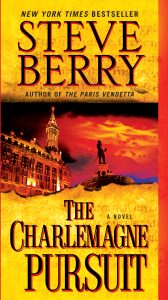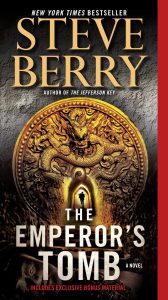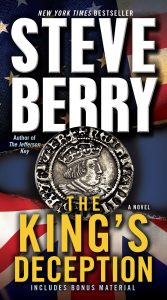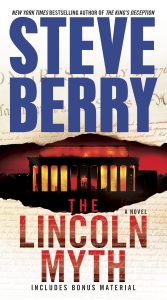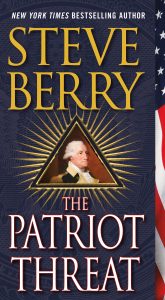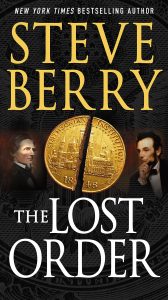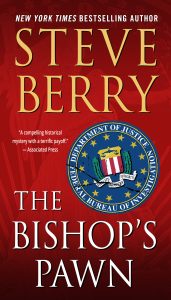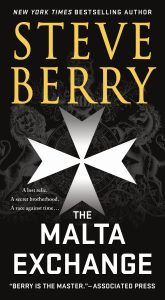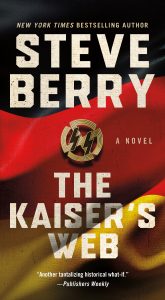The Atlas Maneuver
Cotton Malone Series Book 18
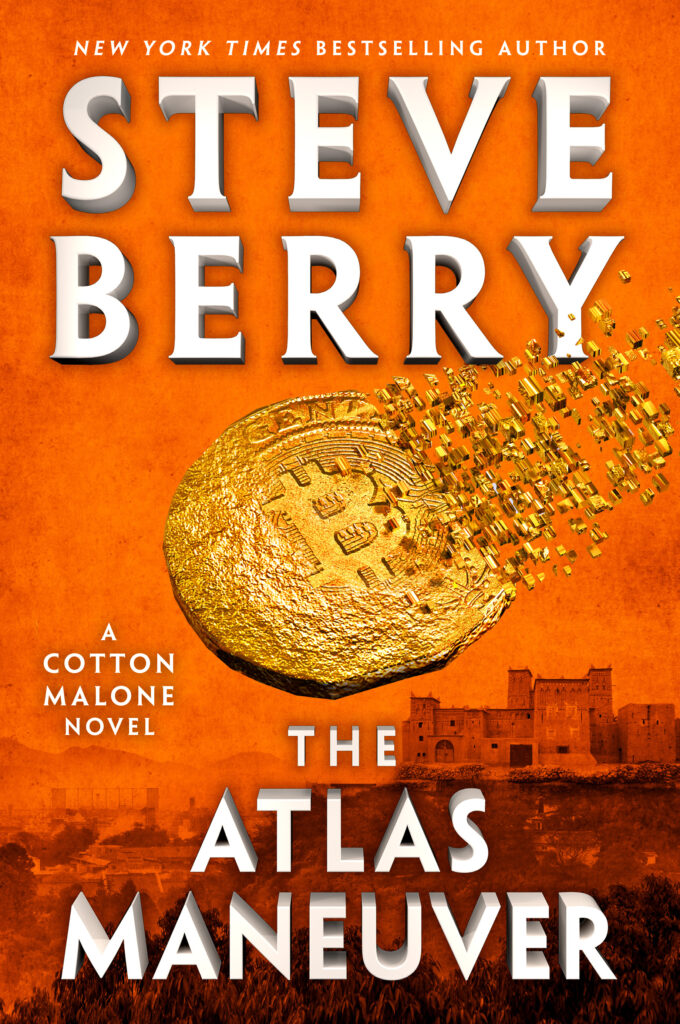 Buy the Book:
Buy the Book:Amazon
Apple Books
Barnes & Noble
IndieBound
Kobo
Signed Copy
Audible
Libro.fm
Kindle
Nook
Synopsis
From celebrated New York Times bestselling author Steve Berry comes the latest Cotton Malone adventure, in which Cotton unravels a mystery from World War II involving a legendary lost treasure, Yamishita’s Gold, worth billions.
1945. In the waning months of World War II, Japan hid vast quantities of gold and other stolen valuables in boobytrapped underground caches all across the Philippines. By 1947, some of that loot was recovered, not by treasure hunters, but by the United States government, which told no one about the find. Instead, those assets were stamped classified, shipped to Europe, and secretly assimilated into something called the Black Eagle Trust.
Present day. Retired Justice Department operative, Cotton Malone, is in Switzerland doing a favor for a friend. But what was supposed to be a simple operation turns violent and Cotton is thrust into a war between the world’s oldest bank and the CIA, a battle that directly involves the Black Eagle Trust. He quickly discovers that everything hinges on a woman from his past, who suddenly reappears harboring a host of explosive secrets centering around bitcoin. The cryptocurrency is being quietly weaponized, readied for an assault on the world’s financial systems, a calculated move that will have devastating consequences. Cotton has no choice. He has to act. But at what cost?
From the stolid banking halls of Luxembourg, to the secret vaults of Switzerland, and finally up into the treacherous mountains of southern Morocco, Cotton Malone is stymied at every turn. Each move he makes seems wrong, and nothing works, until he finally comes face-to-face with the Atlas Maneuver.
"In The Atlas Maneuver, the twists and turns, in usual Berry fashion, keep the reader saying to themselves, “just one more page” repeatedly. Forgotten caches of WWII gold, international conspiracies and, finally, someone explains how cryptocurrencies work and can be manipulated — all of these are part of a gripping, unputdownable thrilling read.”
— The Colorado Sun
"Berry's talent for mixing nonstop action with history is in full swing in his latest. How does the creation of cryptocurrency tie in with the plundering of a vast treasure by Japan near the end of WWII? The answers will surprise and shock even die-hard Berry fans. Whether you are a long-time reader of Cotton's adventures or a newcomer, this book is terrific."
— First Clue Reviews
"Bestseller Berry never takes his foot off the gas in the hyperactive 18th thriller featuring Cotton Malone.
— Publisher’s Weekly
“Spectators will enjoy this walk—well, run—on the wild side.”
— Kirkus Reviews
“This is very likely the best thriller yet, if not the first ever, to master both the potential and inherent risks involved in the cryptocurrency market. Berry is content to partner with our imaginations in bringing his work to life. And with The Atlas Maneuver, he has hoisted us up on his sturdy shoulders, high enough to yet again see future threats no one else has envisioned yet. Superb in all respects.”
— Booktrib.com
“Cotton is an absolute delight: cantankerous and world-weary, with a razor sharp wit and a sense of justice that makes him push on when others might throw up their hands in dismay . . . A fast-paced, well-written, entertaining adventure.”
— Booklist
"Narrator Scott Brick shepherds the new adventure with perfect pacing and emphasis. . . . Brick portrays Malone and the cast of international villains with an authoritative and emotive delivery . . . [he] ratchets up the tension in his delivery as Malone uncovers a vast cryptocurrency conspiracy.”
— AudioFile (reviewing the audio edition)
"Berry is at it once again in The Atlas Maneuver. . . in this case, the Atlas Maneuver itself is purely fictional and from the great mind and imagination of Steve Berry. But like all of his prior works it leaves readers with a sense of dread and the question, What if?”
— Bookreporter.com
FROM THE BLOG WORLD
"Berry delivers a stunning story for all readers to enjoy with ease. There is nothing like reading a novel by an author you respect, knowing that it is a gem, no matter the topic. Steve Berry is once such author for me, able to educate and entertain me with each twist of the plot. Kudos, Mr Berry, for another stunning addition to the Cotton Malone series."
— pecheyponderings.wordpress.com
“Steve Berry is back with another adventure that weaves an exciting tale of history with a chilling conspiracy, creating the kind of conflicting reading experience where you want to read slow and savor but just can’t put the book down and end up knocking it out in a single setting. The Atlas Maneuver delivers one thrill after another and is easily Berry’s best book in years.”
— The Real Book Spy
“This is another great book in the series. It’s all action, on two different fronts, it never lets up, and Cotton is at his finest in this novel. This is one of my favorite series every year, and never disappoints.”
— redcarpetcrash.com
"Berry’s talent for mixing nonstop action with history is in full swing in his latest. Whether you are a long-time reader of Cotton Malone’s adventures or a newcomer, this book is terrific.”
— firstCLUE newsletter
Excerpt
CHAPTER ONE
BASEL, SWITZERLAND
THURSDAY, SEPTEMBER 3rd
9:40 A.M.
COTTON MALONE COULD NOT DECIDE IF THE THREAT WAS REAL OR imaginary. He’d been sent to assess the situation, keep an eye on the target, and intervene. But only if necessary.
Did this qualify?
The streets of Basel were busy. Not surprising given this city of 200,000 had been a commercial hub and cultural center since the Renaissance. Six hundred years ago it was one of Europe’s great cities. Location helped, strategically placed where Switzerland, France and Germany converged, the Rhine River divided downtown into two distinct sections. One from the past, the other rooted in today. Its old town filled two hills that rose against the river’s southern bank. A place full of ivy-clad, half-timber houses which cast the last traces of a long-ago medieval town, the cobbled paths a mix of pedestrian-only and light traffic streets.
He stood, bathed in sunshine, beside one of the more congested traffic routes and enjoyed a bag of roasted chestnuts purchased from a nearby vendor. His target was inside a small boutique, on the other side of the street, about two hundred feet away, where she’d been for the past thirty minutes. Windows of fashionable stores drew a continuous stream of patrons. Lots of cafes, shops, jewelers, designer clothing and, his personal favorite, antique bookstores. Plenty of them too. Each reminiscent of his own bookshop back in Copenhagen. He’d owned it now for several years, the store modest in size, tastefully appointed and well-stocked. He catered not only to bibliophiles, but also to the countless tourists who visited Copenhagen. He’d netted a profit every year, though he spent more time away from the shop than he liked. He was also the current secretary of the Danish Antiquarian Booksellers Association, a first for him as he was not much of a joiner.
But what the hell?
He loved books. They loved books.
People moved steadily in every direction, his brain attentive to the slightest detail that had always signaled trouble in his former-profession. No one stared or lingered too long. Nothing at all out of sync, except for one car. A dark-colored Saab. Parked thirty yards away among other vehicles nestled to the curb. All of the others were empty. But not the Saab. It contained two people, whose forms he could make out through the lightly tinted windshield. The driver and another in the back seat. None of which, in and of itself, should spark any suspicions to most people.
But he wasn’t most people.
He was a trained intelligence officer who’d worked a dozen years for the Magellan Billet, a covert investigative unit of the United States Justice Department. He’d been one of the first people recruited by his old friend, Stephanie Nelle, who both created and continued to run the unit. She’d recently found some trouble with the new American president, Warner Fox, but all that had been resolved and now she was back in command. And though he’d been retired from the Billet for a while now, he continued to work freelance for Stephanie whenever she managed to entice him away from his bookshop. He liked that he was still needed, so he rarely refused her. Sure, there’d come a day when she would ask less frequently and he would become only a bookseller. But thankfully, for now, he still had his uses, though he wasn’t here for Stephanie. This favor was for another friend whom he’d encountered a few months back in Germany.
Derrick Koger.
Recently-promoted European station chief for the Central Intelligence Agency. Who’d piqued his curiosity with an amazing tale of lost treasure.
Billions in plundered gold.
General Tomoyuki Yamashita, who’d commanded the final defense of the Philippine Islands, along with supervising the secretion of that loot, surrendered to the Allies in September 1945, then was quickly tried and convicted of war crimes in December 1945. Two months later Yamashita was hanged.
Why so fast?
Simple.
The Office of Strategic Services, precursor to the CIA, had learned about 175 buried vaults. Yamashita flatly refused to cooperate with locating them and the last thing the Americans wanted was him still alive, able to tell the world about the gold.
So they hung him.
Once that loose end had been eliminated, and the island of Luzon militarily secured, the OSS moved in and managed to retrieve several of the larger caches, tons of unaccounted-for precious metals, which was shipped off to repositories in forty-two countries across the world. All done with the full knowledge and blessing of both General Douglas MacArthur and President Harry Truman.
Why was it taken?
Three reasons.
First, if the recovery of such a huge mass of stolen gold had become known, thousands of people would have come forward to claim it, many of them fraudulently, and governments would have been bogged down for decades resolving ownership.
Second, the sheer volume of the gold, if dumped back on the open market, would have devalued the price. At the time most countries linked their currencies to the U.S. dollar, and the dollar was tied to gold, so an unexpected plummet in value would have caused a worldwide financial disaster.
And finally, once Hitler and Japan had been defeated, the greatest threat to world security now came from the Soviet Union. Communism had to be stopped. At all costs. And hundreds of millions of dollars in secret wealth could certainly be channeled into that purpose.
So, slowly, over time, the retrieved gold and silver was consolidated to one location under the control of what came to be known as the Black Eagle Trust. Where was it centralized? The Bank of St. George in Luxembourg. And there that wealth had sat since 1949, safe behind a wall of secrecy that had only, according to Koger, in the past few months fallen.
Fascinating stuff.
The car with the two occupants cranked to life.
Cotton’s attention shifted from the vehicle to the boutique.
His target had appeared, stepping from the front doorway and turning onto the busy sidewalk. Had the car cranking been just coincidence?
Doubtful.
He’d only seen one photo of Kelly Austin, who was employed by the Bank of St. George. Her job? He had no idea. All he’d been told was to look after her and intervene only if absolutely required. Koger had been emphatic on that last detail. Which was why he’d positioned himself across the street, among people walking here and there, oblivious to anything around them outside of their own concerns.
Kelly Austin walked away from the Saab, which swung from its parking place and crept forward in the street. No cars were behind it, but one was ahead. The one in front accelerated and headed off past Cotton. The Saab though never changed speed.
No question. This was a threat.
Austin kept walking his way, on the other side of the street. No head turns. No looking around. No hesitation. Just one step after another with a shopping bag dangling from one hand, a purse slung over the other shoulder.
Oblivious.
He tossed the chestnuts into the waste can beside him and stepped from the curb, zigzagging against the lanes of traffic to the pedestrian bay at the center. There, at the first break in the cars, he crossed, fifty feet ahead of Austin. People passed by, heading in the opposite direction. The Saab kept coming, moving a little faster, now nearly parallel with Austin.
The rear window descended.
A gun barrel came into view.
No time existed to get closer to Austin. Too far away. So he reached back beneath his jacket and found the Beretta. Magellan Billet issued. Which he’d been allowed to retain after retiring out early. The appearance of the weapon sent a panic through some of the pedestrians. No way to keep the gun out of view.
He told himself to focus.
In his mind the all-pervasive background noise common to cities around the world ground to a halt. Silence dominated his thoughts and his eyes assumed command of the rest of his senses. He leveled the gun and fired two shots into the open rear window. The Saab immediately accelerated, tires grabbing the pavement as the car squealed past. The danger from return fire seemed great. So he sent another bullet into the open window.
People scattered. Many hit the ground.
The Saab raced away.
He focused on the license plate and etched the letters and numbers into his eidetic memory. The car came to the next intersection, then disappeared around the corner. He quickly stuffed the gun back under his jacket and looked around.
His lungs inflated in short, quick breaths.
Kelly Austin was nowhere to be seen.
Also in this series:



